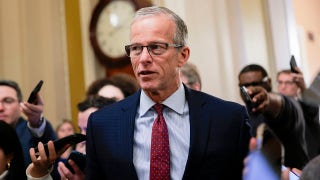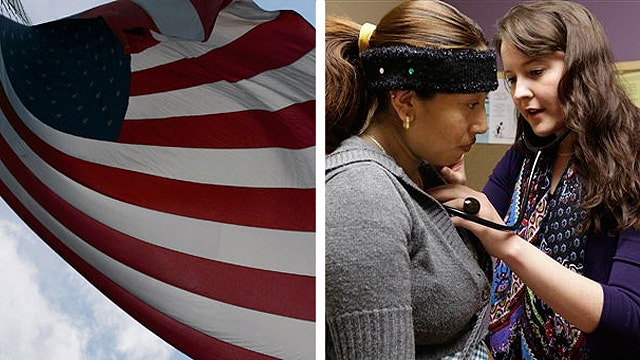The Obama administration's final compromise for religiously affiliated nonprofits that object to covering birth control in their employee health plans is being met with criticism from some opponents of the so-called contraceptive mandate in ObamaCare.
The Health and Human Services Department said Friday the final plan simplifies how insurers provide the coverage separately from faith-based groups and gives religious nonprofits more time to comply. The changes are unlikely to resolve objections from faith groups that the requirement violates their religious freedom.
More than 60 lawsuits have been filed challenging the rule. The cases are expected to reach the Supreme Court. The original plan exempted churches and other houses of worship, but required faith-affiliated charities, universities and other nonprofits to provide the coverage for their employees.
Under the compromise, administration officials said they simplified the definition of religious organizations that are fully exempt from the requirement. The change means a church that also ran a soup kitchen would not have to comply.
Other religious nonprofits must notify their insurance company that they object to birth control coverage. The insurer or administrator of the plan will then notify affected employees separately that coverage will be provided at no cost. The insurers would be reimbursed by a credit against fees owed the government.
Eric Rassbach, an attorney with the Becket Fund for Religious Liberty, a public interest law firm challenging the contraception coverage rule in federal court, said "it doesn't really change the overall way they're trying to do this."
"As we said when the proposed rule was issued, this doesn’t solve the religious conscience problem because it still makes our non-profit clients the gatekeepers to abortion and provides no protection to religious businesses," Rassbach said in a statement.
The Becket Fund represents many of organizations challenging the regulation in federal court, including Ave Maria University, Belmont Abbey College, Hobby Lobby Stores Inc., and Eternal Word Television Network.
Michael P. Warsaw, president and CEO of the Alabama-based EWTN, said in a statement that the finalized rule "is inadequate because it appears to have changed nothing." He added that the religious media network "remains committed to fighting this senseless mandate."
Michael Hash, director of the health reform office of the Health and Human Services Department, said the final regulation spells out in more detail the buffer between religious charities and contraceptive coverage. Faith-based groups were given another reprieve — until Jan. 1 — to comply.
"There's a much brighter line here — a simpler line — and we think that responds to a good many of the comments that we got," said Michael Hash, director of the Health and Human Services office of health reform. More than 400,000 comments were submitted over the last several months, the agency said.
Judy Waxman of the National Women's Law Center, an advocacy group based in Washington, said she would prefer women hear directly about the coverage from their insurer, but her organization could accept the plan. "It's fair," she said.
The Catholic Church prohibits the use of artificial contraception. Evangelicals generally accept the use of birth control, but some object to specific methods such as the morning-after contraceptive pill, which they argue is tantamount to abortion, and is covered under the policy.
The lawsuits are split almost evenly between nonprofit plaintiffs — including several Roman Catholic dioceses — and for-profit businesses who say the rules go against their religious beliefs. For-profit businesses are not included in the accommodation released Friday and were not eligible for the time extension.
The Oklahoma-based Hobby Lobby is the largest and best-known of the businesses that have sued. On Thursday, the 10th U.S. Circuit Court of Appeals in Denver allowed the lawsuit to move forward on religious grounds. The judges said the portion of the law that requires them to offer certain kinds of birth control to their employees is particularly onerous and sent the case back to a lower court in Oklahoma.
On Friday the lower court granted Hobby Lobby a temporary injunction against full enforcement of the law. Businesses that fail to comply potentially face fines based on the number of workers they employ and other factors. The amount for Hobby Lobby could reach into the hundreds of millions of dollars.
Many of the nonprofit lawsuits had been put on hold until the final rules were announced.
Neither the Catholic Health Association, a trade group for hospitals, nor the U.S. Conference of Catholic Bishops had an immediate reaction Friday, saying the regulations were still being studied. New York Cardinal Timothy Dolan, president of the bishops' conference, said he appreciated the time extension.
"We appreciate the extension of the effective date by five months, which is readily apparent in the rule," Dolan said in a statement. "The remainder of the rule is long and complex. It will require more careful analysis.We will provide a fuller statement when that analysis is complete."
The Associated Press contributed to this report.













































